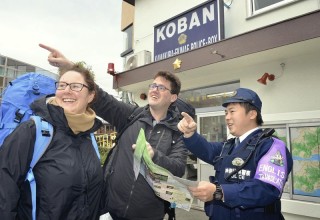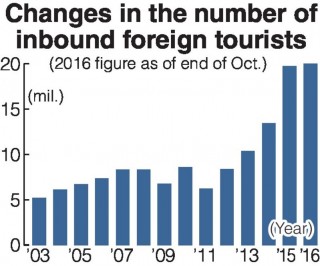Loading
Search
▼ Koban Police Boxes Going Multilingual Ahead of 2020 Games
- Category:Other
Ahead of the 2020 Tokyo Olympics and Paralympics, the National Police Agency has been allocating foreign-speaking police officers for around-the-clock help at koban police boxes at tourist sites or in downtown areas busy with foreign tourists.
The police officers have been or will be assigned to six koban police boxes across Kanagawa, Aichi, Kyoto, Osaka prefectures and Tokyo. Tablet devices with a multilingual automatic translation function will be introduced at the police boxes. The NPA is aiming to provide foreign tourists with a sense of safety and omotenashi hospitality when resolving problems they experience.
‘Very kind’
Kamakura, Kanagawa Prefecture, attracts a large number of tourists because of its historic townscape. The Kamakura-ekimae koban is staffed by three police officers and two counseling staff who are fluent in English. They work in shifts around the clock.
At the police box, a map of the catchment area with explanations in four languages — English, Korean, Chinese and French — are displayed, with tablet devices that function in 20 languages available. Police officers wearing a purple armband have been dealing with foreign tourists in English since Oct. 27.
A 72-year-old man from Hawaii who visited the city on Oct. 27 for sightseeing asked for directions at the koban and was able to arrive at his destination, the Great Buddha of Kamakura.
He said he was kindly given an explanation in English and hoped the service would be expanded to other koban police boxes.
Since September, English-speaking police officers have been assigned to the following koban police boxes: the Metropolitan Police Department’s Kabukicho and Shibuya-ekimae koban; the Kyoto prefectural police’s Gion koban; and Osaka prefecture’s Kansai International Airport terminal koban. The Aichi prefectural police’s Nagoya-eki Nishi koban will start the service in late November.
Range of languages
A record 19.73 million foreigners visited Japan last year. This year, the number of inbound foreign tourists had already surpassed 20 million as of Oct. 30.
According to the NPA, there were 2,771 emergency calls last year from foreigners who do not speak Japanese.
In January, the NPA compiled guidelines for the internationalization of the police, putting strong effort into foreign language education for its personnel.
The police officers have been or will be assigned to six koban police boxes across Kanagawa, Aichi, Kyoto, Osaka prefectures and Tokyo. Tablet devices with a multilingual automatic translation function will be introduced at the police boxes. The NPA is aiming to provide foreign tourists with a sense of safety and omotenashi hospitality when resolving problems they experience.
‘Very kind’
Kamakura, Kanagawa Prefecture, attracts a large number of tourists because of its historic townscape. The Kamakura-ekimae koban is staffed by three police officers and two counseling staff who are fluent in English. They work in shifts around the clock.
At the police box, a map of the catchment area with explanations in four languages — English, Korean, Chinese and French — are displayed, with tablet devices that function in 20 languages available. Police officers wearing a purple armband have been dealing with foreign tourists in English since Oct. 27.
A 72-year-old man from Hawaii who visited the city on Oct. 27 for sightseeing asked for directions at the koban and was able to arrive at his destination, the Great Buddha of Kamakura.
He said he was kindly given an explanation in English and hoped the service would be expanded to other koban police boxes.
Since September, English-speaking police officers have been assigned to the following koban police boxes: the Metropolitan Police Department’s Kabukicho and Shibuya-ekimae koban; the Kyoto prefectural police’s Gion koban; and Osaka prefecture’s Kansai International Airport terminal koban. The Aichi prefectural police’s Nagoya-eki Nishi koban will start the service in late November.
Range of languages
A record 19.73 million foreigners visited Japan last year. This year, the number of inbound foreign tourists had already surpassed 20 million as of Oct. 30.
According to the NPA, there were 2,771 emergency calls last year from foreigners who do not speak Japanese.
In January, the NPA compiled guidelines for the internationalization of the police, putting strong effort into foreign language education for its personnel.
There are about 5,000 police officers and officials nationwide who have language skills equivalent to interpreters. They cover about 26 languages, including Spanish (about 240 personnel), Persian (about 90) and Urdu (about 70), in addition to English, Chinese and Korean.
“We’d like to utilize our personnel to help foreign tourists stay in Japan comfortably,” an NPA spokesperson said.
Translation devices play a role
Dealing with inbound foreign tourists is a requirement in securing public safety. Since the Tokyo Marathon in February, the MPD has used megaphones on a trial basis that automatically translate Japanese into foreign languages for crowd control.
In Tokyo’s Asakusa district, which was on the Tokyo Marathon course, police personnel guiding spectators told foreigners in Japanese that traffic regulations had been implemented and they should take a detour to avoid entering the course.
The instruction was automatically translated into English, Chinese and Korean via the megaphone.
The automatic translation device was also used for traffic control for the Sumida River Fireworks Festival in July, the Rio Olympics and Paralympics medal parade in October, and the Halloween event around Shibuya Station in Tokyo the same month.
There were some mistranslations initially, but the MPD cooperated with the manufacturer and revised the dictionary function. There are now nearly no mistranslations, according to the MPD.
“We’d like to utilize our personnel to help foreign tourists stay in Japan comfortably,” an NPA spokesperson said.
Translation devices play a role
Dealing with inbound foreign tourists is a requirement in securing public safety. Since the Tokyo Marathon in February, the MPD has used megaphones on a trial basis that automatically translate Japanese into foreign languages for crowd control.
In Tokyo’s Asakusa district, which was on the Tokyo Marathon course, police personnel guiding spectators told foreigners in Japanese that traffic regulations had been implemented and they should take a detour to avoid entering the course.
The instruction was automatically translated into English, Chinese and Korean via the megaphone.
The automatic translation device was also used for traffic control for the Sumida River Fireworks Festival in July, the Rio Olympics and Paralympics medal parade in October, and the Halloween event around Shibuya Station in Tokyo the same month.
There were some mistranslations initially, but the MPD cooperated with the manufacturer and revised the dictionary function. There are now nearly no mistranslations, according to the MPD.
- November 15, 2016
- Comment (0)
- Trackback(0)



